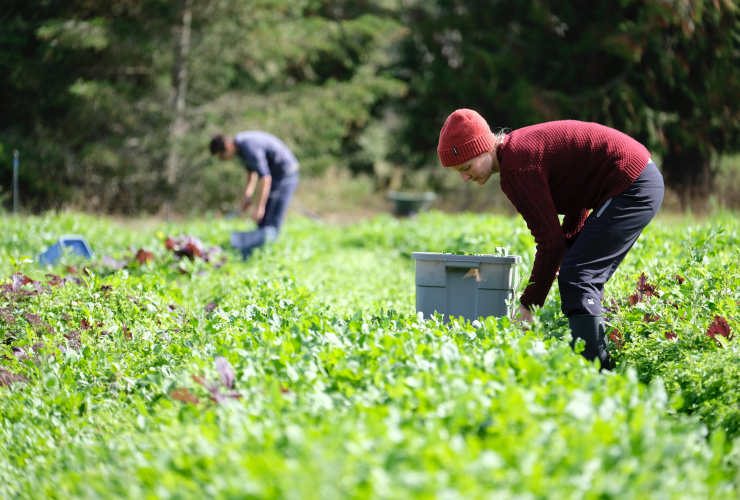Laura Lopez is a construction worker from Mexico living in Vancouver who is scared she won’t have enough money to feed her two kids or pay the rent.
Her husband lost his construction job after the COVID-19 outbreak, she said, compounding the financial situation faced by the family after they had been misled by someone offering to arrange a student visa.
With no ability to access income supports, they turned to their landlord in desperation about foregoing May rent, but were told they still had to pay.
“It’s too much stress for us, feeling like the worst nightmare as a parent, to have no resources to provide for your kids,” Lopez said Thursday, during a press conference arranged by the Migrant Rights Network.
“We cannot imagine ourselves on the street with our kids, having no way to provide them any food. It’s not safe in this situation,” she said, about the danger of becoming infected with the novel coronavirus.
“It’s just insane. We really want to ask the government to help us with this.”

No valid social insurance number, no relief
Lopez said she has no social insurance number, or SIN, which means she can’t access the Canada Emergency Response Benefit (CERB), the federal government’s $2,000-per-month relief cheques sent to Canadians who have stopped working due to COVID-19.
But like the other 1.8 million migrant and undocumented workers in Canada, she still helps the country thrive, cleaning hospitals, delivering food, picking produce in orchards or fields, taking care of children or seniors, or working on construction sites or in warehouses, often in exchange for low wages or no benefits.
Lopez and others like Gustavo Antonio — a migrant worker in Mexico who said he has been travelling to British Columbia for 17 years under Canada’s Temporary Foreign Worker Program — say they are facing increased financial hardship because of the virus.
“Given that our income is solely from the work I do in Canada, I’m experiencing tough financial times,” said Antonio, who said he has been unable to travel to Canada despite having a work permit because of COVID-19 restrictions.
“I can’t pay for the bills to support my family, for example for my daughter who goes to school, which is expensive,” he said.

'I think it is fair, and that I have the right' to help
Lopez, Antonio and other migrants who spoke during the press conference say it’s only fair that Canada would support them as it is supporting other people in the country.
“I think it is fair, and that I have the right, to receive help from the Canadian government,” said Antonio.
For temporary foreign workers who hold valid work permits, the situation is similarly problematic, according to Syed Hussan, executive director of Migrant Workers Alliance for Change.
Temporary workers are given SINs that expire when their permits do, and renewing such permits takes months, he said. With the pandemic, this process has been further delayed, said Hussan, so these temporary SINs are expiring, shutting out more people from the CERB.
“Never before have I seen the incredible depths of despair, suffering and looming calamity that I’m seeing in our communities right now,” said Hussan.
On April 14, the Migrant Rights Network wrote to the federal government asking for the CERB to be extended to people without valid SINs, through another system called the Individual Tax Number (ITN).
ITNs are nine-digit numbers given to non-residents who want to file income tax returns. Hussan argued that thousands of undocumented workers already use ITNs so the mechanism would not be unusual.
The Trudeau government said this week it would extend its relief programs to seasonal workers without jobs and people who have had hours cut but who still have income.
The offices of Immigration Minister Marco Mendicino and Revenue Minister Diane Lebouthillier directed questions about whether the government would consider extending the CERB to people without a valid SIN to Employment Minister Carla Qualtrough. Her office acknowledged the receipt of questions, but could not immediately provide a response before publication.

Workers feeling 'forgotten by society'
Hussan said he has heard from over 2,000 workers in the last month who have an invalid SIN and cannot access income supports.
“In a public health crisis, unless we protect everyone, we cannot protect anyone...this isn’t simply a question of morality or fairness. Providing income support to everyone is a public health imperative,” he said.
That includes people like Alina Przybyl, an international student in Toronto who said her study permit expired in January and because of immigration processing delays, has not received an extension, leading to her SIN expiring and freezing her out of the CERB.
She said she has lost her job working as a waitress when her work was closed mid-March and everyone was laid off. With no knowledge of how long the pandemic will last, Przybyl said she has no idea how she will pay for food and rent.
“I think it’s really hard for me to believe migrants like myself, and all migrants cannot get support because of a formality like an expired SIN,” she said.
“It’s really difficult to process that, because we’re in a global crisis, and we’ve been hearing over and over that we’re in this together — but many of us are still facing barriers.”
Those barriers are also hurting Cesar Paredes, a construction worker in Toronto without a valid SIN, and a wife who is pregnant and due late May. He said it has become an “unbearable situation.”
“We are asked to stay home. The reality is I cannot stay home,” said Paredes. “I don’t have any kind of support. I need to hustle basically every day to get some work done for me and my wife.”
Like Lopez, he said his landlord is refusing to let him forego May rent, and he feels desperate, “forgotten by society.” Still going to odd jobs in construction, Paredes said he is scared he could be exposing himself to COVID-19 or exposing his wife every time he comes back home.
“This is the reality that many of us are facing,” said Paredes. “If the COVID doesn’t kill us, hunger or homelessness will.”
Carl Meyer / Local Journalism Initiative
The rich have always been
The rich have always been content to let some citizens fall through the cracks, and we couldn't close them. Now, they are gaping wide, because the plutocrats consider us as disposable as cattle. They are even trying to grab the Lion's share of government benefits; let's just end their fortunes instead.
Another of the dirty secrets
Another of the dirty secrets the wealthy, people and nations, try to bury... just how dependent they themselves are on the agricultural and industrial profits they harvest while their "temporary/undocumanted" workers endure living and social conditions akin to slavery.
The explicit message of the kleptocrats and their governments is that impoverished foreigners are sub-human, deserving of only the most degrading work that "Whites" will not do, pay rates that "Whites" cannot exist on, and every kind of extortion/exploitation their employers can dream up, unimpeded by any legal protections for these human beings.
Of course there is a lengthy history of such capitalist greed in Canada. Paying indigenous trappers pittances for pelts and/or cheating them entirely. Recruiting desperate Irish "navvies" to build the Rideau Canal, killing many of them in the process. Recruiting Chinese labourers to build our national railroad network and deporting the undesirable survivors back to China when no longer required. Canadian Colonial Capitlism has exctly the same profile as all the other colonial enterprises ever visited upon unprepared peoples. The current crop of smug Canadian top layer corporations; Banks, Investors, Financiers, have inherited the crimes and habits of colonial oppressors and exploiters.
There is nothing there to be proud of.






Comments